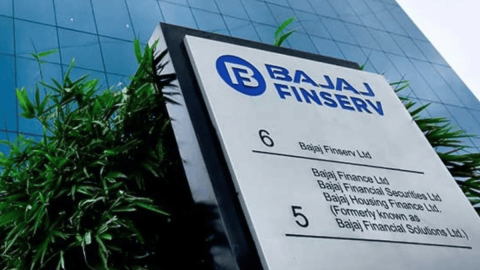Bajaj Finance Share Price Recovers after Investment Grade Rating from Moody's
Global rating agency Moody’s Investors Service has assigned a Baa3 investment grade rating to Bajaj Finance Ltd (BFL) for the first time, with a stable outlook. This rating reflects BFL’s solid position as India’s largest retail-focused non-banking financial company (NBFC), supported by a diverse loan book, strong risk-adjusted profitability, and competitive funding costs. With consolidated assets under management (AUM) of Rs 3.5 trillion (USD 42 billion) as of June 2024, BFL is poised for continued market share growth, while maintaining its strong financial and risk management foundation.
Bajaj Finance: India’s Leading Retail-Oriented NBFC
Bajaj Finance’s Baa3 investment grade rating from Moody’s highlights the company's entrenched position as the largest retail-focused NBFC in India. Moody’s assessment underscores BFL’s vast customer base, extensive distribution network, and its leadership in India’s rapidly expanding retail finance market. The company's scale allows it to efficiently serve millions of customers across a wide range of segments, from consumer durables to unsecured loans.
BFL’s diverse loan book plays a key role in maintaining its strong profitability. With a well-balanced mix of short- and long-term loan products, the company is able to navigate asset quality trends across various sectors while sustaining high risk-adjusted returns.
Strong Loan Diversification Enhances Financial Flexibility
One of the key strengths cited by Moody’s is BFL’s loan portfolio diversification, which provides the company with operational flexibility. Bajaj Finance’s wide range of loan offerings allows it to strategically calibrate loan growth based on prevailing market conditions and asset quality trends in specific segments. The company's ability to shift focus among various loan categories depending on market risks and opportunities contributes to its strong financial health.
Additionally, this diversification enhances asset-liability management (ALM) by enabling the company to maintain a judicious mix of short- and long-term loan assets, ensuring effective liquidity management across business cycles.
Risk Management Amid Unsecured Lending Exposure
Despite its significant exposure to unsecured lending, which is inherently riskier during economic downturns, BFL has implemented robust risk management practices. Moody’s report acknowledges that Bajaj Finance has employed a variety of risk mitigation strategies to maintain adequate risk-adjusted returns. These include rigorous credit assessments, advanced data analytics, and a proactive approach to credit monitoring. Such measures ensure that the company remains resilient in the face of potential economic shocks, safeguarding its profitability while managing risks effectively.
Future Growth: Market Share Expansion and Asset Growth
Moody’s outlook for Bajaj Finance remains stable, with the agency anticipating continued market share growth. BFL's ability to scale its already significant franchise is underpinned by its consolidated AUM of Rs 3.5 trillion (USD 42 billion) as of June 2024. The company’s extensive distribution network, combined with its ability to serve diverse customer segments, positions it to capture additional market share across India’s expanding retail credit market.
Bajaj Finance’s strategic positioning in both urban and rural areas, along with its focus on digital transformation, provides a solid foundation for long-term growth. As the company continues to innovate and leverage technology, it is well-positioned to capitalize on new business opportunities in a rapidly digitizing economy.
Capitalization and Competitive Funding Costs
Moody’s rating also considers BFL’s strong capitalization and access to competitive funding costs. The company has consistently maintained high levels of capital adequacy, providing a buffer against potential economic and market volatility. Bajaj Finance’s ability to raise funds at competitive rates further supports its growth strategy, allowing the company to expand its loan book while maintaining profitability.
BFL’s strong credit rating and established relationships with lenders give it an advantage in securing favorable funding terms, which in turn helps sustain its competitive edge in the NBFC sector.
Key Risks: Economic Shocks and Project Delays
Despite its strengths, Bajaj Finance faces certain risks, as noted by Moody’s. Economic shocks, particularly those that affect consumer spending or employment, could impact the company’s large unsecured lending portfolio. While BFL has strong risk management systems in place, a prolonged economic downturn could lead to higher delinquency rates and impact the company’s profitability.
Another potential risk highlighted by Moody’s is project delays within the company’s growth initiatives or external factors, such as regulatory changes. These risks, while manageable, could slow down the pace of market share expansion or affect near-term profitability.
Conclusion: Bajaj Finance Well-Positioned for Sustained Growth
Moody’s Baa3 investment grade rating for Bajaj Finance underscores the company’s strong market position, diversified loan book, and robust risk management practices. With a stable outlook and continued market share growth expected, BFL remains a leader in India’s retail-focused NBFC space. The company’s ability to leverage its diversified portfolio, maintain competitive funding, and manage risks effectively positions it for sustained growth in the coming years.
Investors should, however, remain mindful of potential risks related to economic fluctuations and project delays. Nevertheless, Bajaj Finance’s stable rating and solid financial foundation suggest that the company is well-equipped to navigate future challenges and capitalize on growth opportunities.
Disclaimer: This report is for informational purposes only. Investors are encouraged to conduct their own research or consult financial advisors before making any investment decisions.
